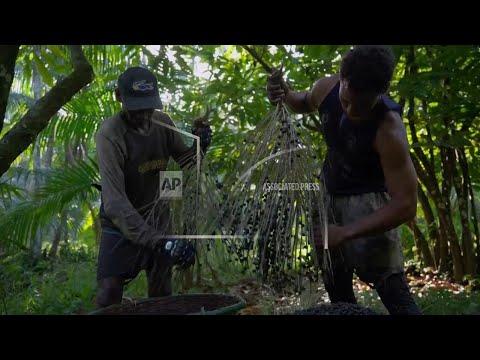(6 Aug 2025)
RESTRICTION SUMMARY:
ASSOCIATED PRESS
Belem, Brazil – 05 August 2025
1. Various of harvester picking acai and sliding down a tree
2. Harvesters picking acai berries
3. Harvesters carrying buckets full of acai berries
4. Harvesters putting a crate of acai berries in the boat
5. SOUNDBITE (Portuguese) Ailson Ferreira Moreira, acai producer:
“The acai that’s all produced here, if only people consume it here, it’s going to be a lot of acai, right? Then there are the factories that export and the price is good. If there’s too much acai here, people won’t be able to consume it all and the price will drop.”
6. Harvesters on boat through the forest
7. Various of harvesters picking berries
8. Aerial of Combu Island ++MUTE++
9. SOUNDBITE (Portuguese) Mikael Silva Trindade, acai harvester:
“If it doesn’t get exported, it will stay here and the acai will be cheap, there will be nowhere to market it. I think it’s bad because the more you export, the more valuable it becomes. But if there’s too much to sell, it will stay here and become cheap.”
++NIGHT SHOTS++
10. Man carrying a crate of acai berries from a boat
11. Various of crates full of acai berries
12. Various of Ver-O-Peso acai open market
13. Aerial shot of open market ++MUTE++
STORYLINE:
The 50% tariffs imposed by the U.S. president Donald Trump on Brazilian products threaten the acai supply chain, a superfood highly popular in the United States.
Nearly all acai berries consumed in the U.S. come from Brazil, especially from the state of Para and accounts for 90% of the country’s production.
More than a trend, acai provides income for traditional communities and helps preserve the Amazon.
With the tariffs, the most vulnerable producers are already feeling the impact, with lowering prices because of surplus.
“If it doesn’t get exported, it will stay here and the acai will be cheap, there will be nowhere to market it,” harvester Mikael Silva Trindade told the Associated Press while picking acai berries.
A very demanding job, the harvest includes climbing acai trees with virtually no safety equipment and sliding down with branches of the berry as many times as needed to fill a basket, then a crate.
A full crate of acai berries at the local market sells for around $50, but the price is expected to plummet.
Acai exports from Para production jumped from less than 1 ton in 1999 to more than 61 thousand tons in 2023, according to ABRAFRUTAS (Brazilian Association of Fruit and Derivative Producers and Exporters).
The United States is by far the largest importer of the Brazilian berry, but with 50% tariffs, there could be a hike in prices for the American consumer of smoothies and superfood bowls.
AP Video shot by Alan K Guimarães
===========================================================
Clients are reminded to adhere to all listed restrictions and to check the terms of their licence agreements. For further assistance, please contact the AP Archive on: Tel +44(0)2074827482 Email: info@aparchive.com.
Find out more about AP Archive: http://www.aparchive.com/HowWeWork
Twitter: https://twitter.com/AP_Archive
Facebook: https://www.facebook.com/APArchives
Instagram: https://www.instagram.com/APNews/
You can license this story through AP Archive: http://www.aparchive.com/metadata/youtube/5dbe81451d454735bc5fcf27639aa553
Author: AP Archive
Go to Source
News post in August 11, 2025, 6:06 pm.
Visit Our Sponsor’s:
News Post In – News





